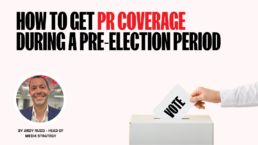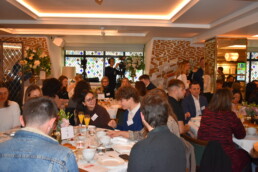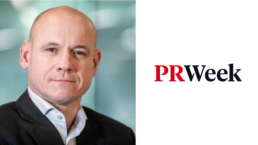How to Get PR Coverage During a Pre-Election Period
In the run-up to any election, the media landscape becomes particularly charged. Political coverage takes centre stage, often overshadowing other news. This shift can make it challenging for brands to secure PR coverage. However, with the right strategy, brands can still shine. Here's how to navigate the pre-election period to ensure your PR efforts are effective and impactful.
Understand the Media Climate
During the pre-election period, newsrooms are inundated with political stories. This intense focus on politics can make it seem like there's little room for other news. However, this is also a time when non-political stories can stand out, especially those that offer a respite from the constant election coverage.
Key Points:
- Political Saturation: Expect heavy coverage on candidates, policies, and election updates.
- Opportunity for Light Stories: Media will seek lighter, feel-good stories to balance the heavy political news.
Timing is Everything
One of the first questions brands face is whether to postpone their campaigns until after the election. While postponing might seem like a safe bet, it's not always necessary. In fact, launching your campaign during a quieter PR period can sometimes give you a competitive edge.
Considerations:
- Campaign Timing: Evaluate the news cycle and identify quieter periods.
- Strategic Launches: Consider launching when the election news is expected to hit a lull, perhaps during weekends or public holidays when political news slows down.
Crafting the Right Story
Not all stories will get coverage during the pre-election period. To cut through the noise, your story needs to be compelling and relevant. Focus on stories that offer value, entertainment, or a unique perspective.
Tips for Story Crafting:
- Human Interest: Highlight stories that showcase personal triumphs, community efforts, or human interest angles.
- Topical Relevance: Tie your story to current trends or events, making it timely and newsworthy.
- Visual Appeal: Provide high-quality visuals to make your story more appealing to editors and audiences alike.
Leveraging the Strength of the Newswire
Newswires, such as SWNS which we use to place our 72Point page-ready news content, are an invaluable tool during this period. They help disseminate your story to a wide audience quickly, increasing the chances of coverage. The strength of the newswire lies in its reach and ability to connect your story with the right journalists and outlets.
Benefits:
- Wide Distribution: Reach multiple media outlets simultaneously.
- Targeted Approach: Use the newswire’s targeting options to focus on specific regions or industries.
- Quick Turnaround: Ensure your story gets out fast, especially if it’s time-sensitive.
Building Relationships with Journalists
Having strong relationships with journalists can be a game-changer. Journalists are more likely to cover stories from sources they trust. Engage with journalists ahead of time, understand their interests, and provide them with valuable content.
Relationship Building:
- Personal Outreach: Reach out to journalists with personalised pitches.
- Follow-Up: Maintain regular communication and follow-up on your pitches.
- Provide Value: Offer exclusive insights, data, or interviews that can make their job easier.
Preparing for Post-Election
While some brands may choose to wait until after the election to launch their campaigns, it's essential to prepare for this period as well. Post-election, there will be a surge of news coverage analysing the results and implications. Having a well-timed, compelling story ready to go can help you capitalise on the renewed attention.
Post-Election Strategy:
- Monitor the News: Keep an eye on the election results and media coverage.
- Be Ready: Have your campaigns ready to launch once the election noise starts to settle.
- Quick Adaptation: Be prepared to adapt your strategy based on the election outcome and subsequent news cycle.
If you want to talk to our team of news experts to scope out your pre-election comms strategy, get in touch with me at andy.rudd@72point.com
Exploring the Impact of AI in PR and Journalism: Insights from our recent roundtable breakfast

On Tuesday we gathered experts to discuss the profound influence of artificial intelligence (AI) on public relations (PR), journalism, and visual communication. Moderated by our own Sam Brown, the event featured insightful discussions and demonstrations on the role of AI in shaping content creation, crisis management, and ethical considerations. Huge thanks to Stuart Bruce from Purposeful Relations, Karyn Fleeting from Reach PLC and AI artist Duncan Thomsen for joining us and sharing their knowledge.
Below we delve into some key highlights from the event, but you can also rewatch the full discussion HERE.
AI in PR and Journalism
The discussion opened with the practical applications of AI in PR and journalism. Karyn highlighted the automation of routine tasks such as research, media monitoring, and audience insights, emphasising the need to balance automation with human expertise. Stuart delved into the role of AI in personalising content and pitching strategies, while exploring the intersection of AI and PR innovation.
Karyn discussed AI’s transformative impact on data-driven reporting and investigative journalism. The conversation also touched on the benefits and challenges of incorporating AI tools into journalistic practices, with a keen focus on maintaining editorial integrity and accuracy. Stuart provided insights into the implications of AI advancements for PR professionals, highlighting the importance of adapting to evolving media landscapes.
AI's Influence on Creative Ideas
Duncan's captivating artwork served as a backdrop to explore AI's influence on creative ideation and visual communication. The panel discussed the potential of AI to contribute to creative processes traditionally driven by human intuition and imagination. The conversation also delved into the implications of AI-generated content for PR and journalism, sparking thought-provoking reflections on consumer perceptions and engagement.
Enhancing Visual Storytelling with AI
The panel examined how AI enhances visual storytelling in PR and news media, with Karyn shedding light on its role in generating compelling images. Stuart explored AI's efficiency in content creation, particularly in generating visually engaging materials. Duncan raised ethical considerations surrounding the use of AI to manipulate and analyse images, prompting discussions on transparency and accountability.
AI in Crisis Management
The serious side of AI deployment was explored, particularly in crisis management scenarios. Stuart elaborated on AI's role in sentiment analysis and real-time monitoring during crises, citing examples of successful AI-driven strategies. The discussion underscored the importance of leveraging AI technologies to detect and respond to emerging news and trends effectively.
Ethical Considerations in AI
Ethical considerations took centre stage, with Karyn sharing insights into Reach's comprehensive AI policy. The panel delved into the ethical implications of bias in AI algorithms for PR and journalism, advocating for transparency and trust-building measures. Discussions also revolved around addressing privacy concerns related to AI data collection and usage, highlighting the need for robust ethical frameworks.
Future of AI in PR and Journalism
As the event drew to a close, the panelists pondered the future of AI-driven PR and journalism. They identified key skills and knowledge areas essential for success in the AI-driven landscape while acknowledging adoption barriers and emerging trends. The conversation concluded with optimistic predictions for the continued evolution of AI in PR, journalism, and visual communications, underlining the transformative potential of responsible AI deployment.
We have more great events in the pipeline - If you’d like to be included on the invite please email victoria.obrien@72point.com.
A Night Of Sky High Thinking
Unveiling the tapestry of consumer trust, corporate social responsibility and economic realities
This week, we had the pleasure of hosting clients from top organisations such as BA, Wickes, Readdle and Smart Energy GB. Alongside a delicious dinner and some fantastic views, there was insightful conversation around our latest consumer insights we generated with OnePoll (our research arm of 72Point). You can find my top takeaways below:
Trust in the Age of AI
Artificial Intelligence (AI) has swiftly transitioned from a futuristic concept to an omnipresent force in our lives. However, alongside its proliferation comes a growing concern over trust. Recent surveys indicate a notable shift in public perception, particularly concerning image manipulation. As consumers become more tech-savvy, they are increasingly aware of AI's capabilities and limitations in altering reality.
Yet, amidst this understanding, trust issues loom large, worsened by the misuse of AI as a marketing buzzword. Companies using AI without transparency risk eroding consumer trust. The misrepresentation of AI's capabilities not only undermines credibility but also alienates consumers who feel misled. Brands bear a responsibility to educate customers about AI's reality.
Strategies such as providing educational resources and engaging in open dialogue empower consumers, fostering a sense of partnership rather than patronage.
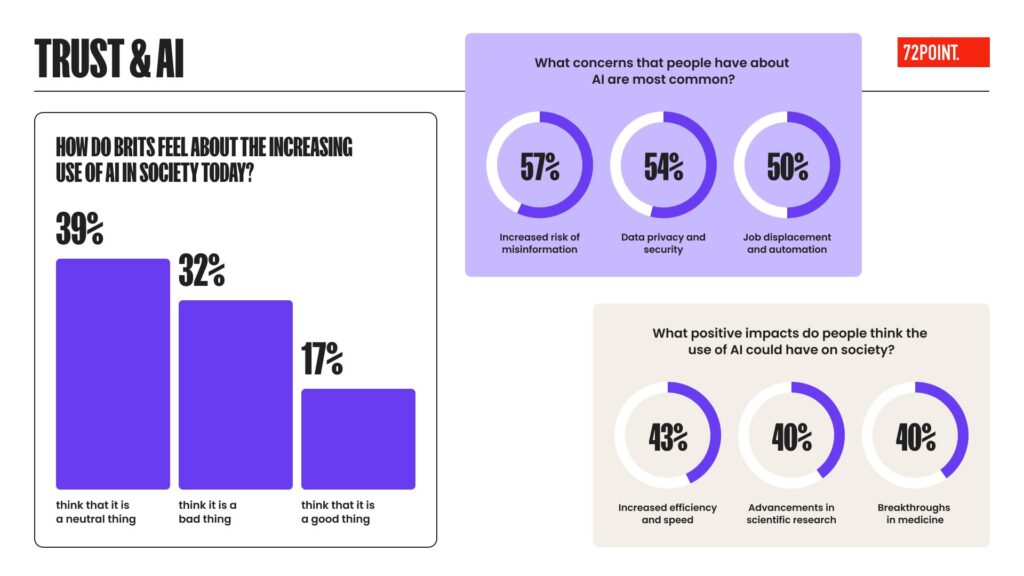
Embracing Genuine Corporate Social Responsibility
Corporate Social Responsibility (CSR) has transcended mere philanthropy to become a cornerstone of brand identity. Recent insights underscore the growing importance of genuine action in CSR efforts. Consumers demand more than lip service; they seek tangible evidence of brands' commitment to social and environmental causes.
Clear CSR initiatives wield significant influence over consumer perceptions. Brands that prioritise authenticity in their CSR endeavors not only enhance their reputation but also cultivate loyalty among consumers. Award-winning PR campaigns often hinge on purpose-led, CSR-focused initiatives, underscoring the symbiotic relationship between brand belief and societal impact.
Sustainability lies at the heart of contemporary CSR initiatives, yet navigating this terrain is fraught with complexity. Consumers discern between genuine sustainability efforts and superficial gestures, gravitating towards brands that demonstrate a sincere commitment to environmental stewardship. Brands must transcend mere box-ticking exercises, embracing sustainability as a core ethos rather than a fleeting trend.
Consumer attitudes towards CSR initiatives are nuanced, shaped by socioeconomic factors such as the cost of living. Despite financial constraints, consumers increasingly prioritise brands that align with their values, underscoring the pivotal role of CSR in purchasing decisions. Brands can bridge the gap between aspiration and reality by making CSR efforts tangible and relatable, fostering meaningful connections with local communities.
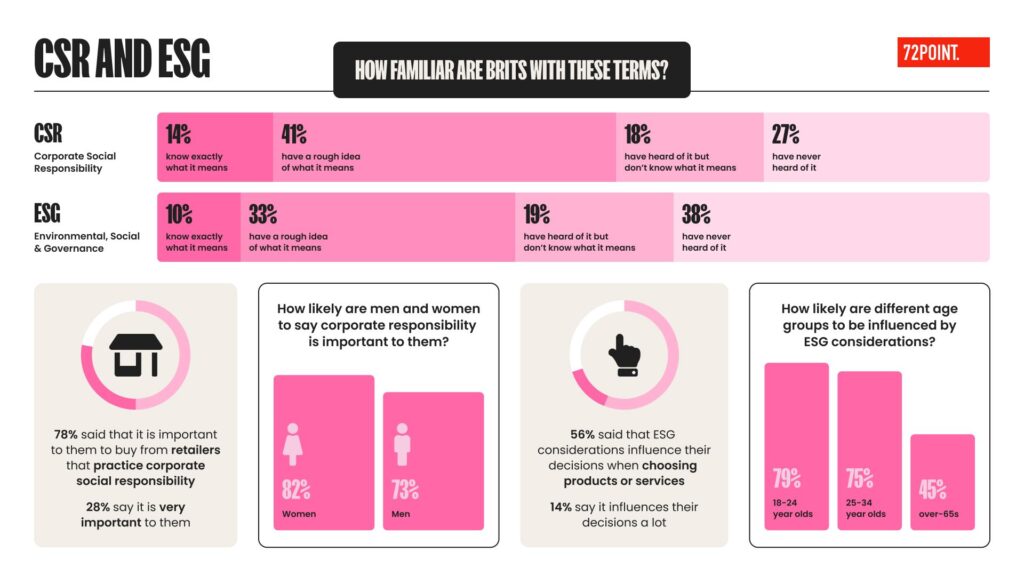
Navigating Economic Realities and Sustainable Choices
In the realm of consumer economics, sustainability appears as a pivotal consideration. Motivated by environmental concerns, individuals grapple with the complexities of balancing social good with financial constraints. While sustainability is a compelling factor in buying decisions, economic realities often dictate choices.
The allure of cheaper products presents a formidable challenge to brands striving to incorporate sustainability into their offerings. Consumers weigh the tangible benefits of cost savings against the intangible allure of sustainability, posing a conundrum for businesses looking to effect change.
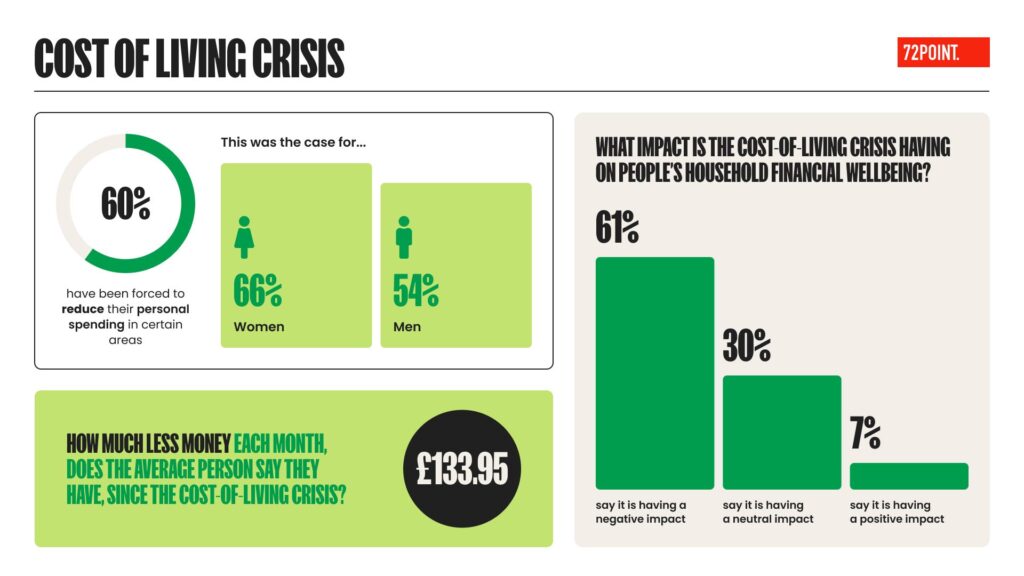
In conclusion, the interplay between trust, CSR, and economic considerations shapes the contemporary consumer landscape. Brands that navigate these dynamics with integrity and foresight stand poised to not only survive but thrive in an ever-evolving marketplace. By fostering trust, embracing genuine CSR initiatives, and navigating economic realities, brands can forge meaningful connections with consumers, transcending transactional relationships to cultivate lasting loyalty.
This was the first in a series of executive dinners we’ll be hosting throughout the year. If you’d like to join me at the next one, drop me a line at james.coleman@72point.com.
Vacancy: Senior Creative Account Manager - Maternity cover
Employer: 72Point Ltd
Title: Senior Creative Account Manager
Employment type: Full time maternity cover
Start date: January/February 2023
Location: Bristol
Who we are:
72Point is the market-leader in content creation.
We generate, produce and deliver top quality news stories, pictures, videos, visual puzzles and animated infographics to the national news media and beyond.
Our client list includes a string of huge global brands, as well as some of the biggest names on PR Week’s Top 150.
We land coverage every day in print, online and via social platforms.
We are part of the SWNS Media group. SWNS proudly brings the heartbeat of Britain to life for our biggest news brands. Every day, hundreds of our stories, images and videos are published and broadcast across the national media.
SWNS content spans breaking news, court cases, amazing human interest stories, consumer issues, health studies, scientific breakthroughs, opinion polls, and stunning imagery and viral videos.
We distribute to the biggest news publishers in the world – from the Sun, Mirror and Daily Mail to the Times, Telegraph and New York Post.
Who we’re looking for:
We're after a senior creative account manager to join our team in Bristol as maternity leave cover – who will have at least 3 years’ experience working in a PR agency.
You will be ambitious, super-keen and a fast learner, and able to hit the ground running.
You must have a keen interest in popular news content across digital, social and print platforms, a fascination with how the industry works and a hunger to soak it up.
A minimum of an A Level in English and / or Media Studies is desirable.
You must also be calm under the pressure of tight deadlines, brilliant at juggling multiple pieces of work, and be able to build a rapport with our clients with your friendly and warm telephone and email communications.
The role:
Based at our Bristol HQ, the role will involve overseeing projects for clients from the idea stage to the subsequent issue to the national news media.
The successful candidate will generate strong creative concepts, contribute to brainstorms, pitch to clients, write up ideas, compile survey questions, write tight, engaging news copy and attend meetings / calls regularly.
They will also liaise with the digital, video, design and social teams to ensure projects run seamlessly.
This role will give you a unique understanding of all parts of our business and the wider news and PR industry.
The successful candidate will have the flexibility of working from home once a period of training has been concluded. However, all staff are currently required to work from the office for a minimum of two days per week.
All applicants will ideally have:
3 years working in a PR agency
A qualification in English A Level / be able to demonstrate excellent written skills
Be confident and personable with the ability to quickly strike a rapport with people, both in person and on the phone
Have an understanding of, and interest in, how news stories are presented in the digital environment
Benefits:
SWNS has a generous and growing list of employee benefits, including:
- 25 days annual holiday plus eight Bank Holidays
- Company pension scheme with employer contribution
- Hybrid working policy
- Enhanced maternity and paternity packages
- Life assurance scheme
- Shopping discount scheme, tech benefit scheme
- Gym membership discount, Cycle to Work
- Savings on childcare
Please apply to adminnewsgen@72point.com with a CV and cover letter.
Why your email media pitches are ignored - Chris Pharo tells all to PRmoment
"I'm constantly asked to explain how creating content for wire distribution is different to crafting press releases, and what we mean by page-ready content."
Read Chris Pharo's piece on PRmoment here.
Sunday for Monday - Jay Williams tells PRCA why they are a win for clients
"Why do so many PRs rule out ‘Sunday for Mondays’? We routinely get pushback from clients when the slot is suggested. I don’t understand it. It seems that it has somehow become ‘received wisdom’ – perhaps on the basis of a project that failed to launch. But rejecting it out of hand is actually evidence of the disconnect between PR and the media. A misunderstanding of what the media wants".
Read more about how Sunday for Mondays are a win for clients here.
Harry Gove, OnePoll & PRMoment
Harry Gove from OnePoll, 72Point's market research arm of the business speaks to PRMoment on Top tips for getting research stories to land in the media.
"There’s an art and science to this almost alchemic process, which requires transforming skill, knowledge, expertise, and collaboration into a piece, newsworthy of being picked up by titles such as The Telegraph, Mail Online, New York Post and News.com Australia.
Achieving coverage, starts with the quality of research and there are key areas in how research is conducted that contribute directly to the coverage achieved."
Dan Harding's Hidden Talent
Our Broadcast Editor Dan Harding talked with PRMoment about the book he's written called 'Gay Man Talking', all whilst jugging shoots and keeping clients happy:
"During the pandemic and juggling multiple video shoots (four to five a week) I wrote an important book for the LGBTQ+ community and its allies, Gay Man Talking - All the Conversations we Never Had .
The book is being published next month, and I'm proud (nervous) of it coming out. For anyone working a full-time job and then doing a hidden talent on the side, then putting a heartfelt product out there, I applaud you. It's been a journey and a lot of late nights. I think it's so important to celebrate peoples talents outside of their nine to five, encouraging people to pursue passions and excel in other areas.”
Click here to read the full piece on hidden talents in PR.
Yes, Stay Close To Your Clients, But Also the Media
WPP's Mark Read has issued his take during this 'summer of discontent': "I'd advise clients to stay close to their customer. Stay close to the agency."
I'd go one further than Mark Read and say: "Stay close to the media."
For those that have been here before, you will be aware of the drill. Recession is on the horizon, purse strings are being tightened, and in this industry, we’re re-thinking exactly how important that press release about a new fridge really is.
Recession talk is like a run on the bank. Fear strikes, the chatter gets louder, and before you know it, it’s happened.
‘Reading the room’ is a big part of our remit, more than ever right now. Considering every facet of consumer spending is the universal strategy across every press office.
And the coming few months are going to be challenging in the extreme as we face a crash in consumer confidence.
Deeply depressing for sure, but what do we do about it? And, remember, you’re being paid to promote that new fridge.
The simple truth is this: we must play our part in turning things around.
While marketing must adapt to this new landscape, and adopt an appropriate tonality amid the crisis, the biggest mistake it can make is going quiet.
Consumers will still spend their hard-earned money, but will turn to brands they trust and value.
Publishers are not immune to the downturn. Advertising spend, already damaged by the pandemic, will take a further hit.
The cost of the very paper that print editions are made from has soared. Last November, The Economist quoted one newspaper boss saying: "It's like tasering an elderly person who is already on a pacemaker."
Fewer pages means fewer stories. The move to online will gather apace.
But it is tough to monetise digital news. Those behind paywalls with fare better, but their audiences, by design are niche. The free to air publishers are using a variety of strategies to turn this around, almost all aimed at driving mass audience numbers based on page views and engagement. This presents a huge challenge to PR.
Bleak, right? But these challenges are not insurmountable. Great ideas will always cut through.
The litmus test for every project must be this - would you read it? If you cannot answer that question with a resounding yes, you're on the wrong track.
I am reminded of a conversation I had some years back with a publicist from an agency that shall remain nameless.
Relating that a former colleague of mine on The Sun was receiving 800 press releases daily when they used to receive less than 100, and that, as a result, she had stopped reading any from someone PRs she didn't know, the publicist replied: "But that's her job."
Except it isn't. Journalists do not care what our clients want. They only care about what their readers want.
In these straitened times making our work interesting and relevant isn't enough. We must make it matter.
By Chris Pharo, Managing Director
Rob Etheridge & PRMoment - Activities you might want to avoid
72Point Senior Account Manager, Rob Etheridge talked with PRMoment alongside comms professionals on PR's biggest time wasters.
“I wish I could get back the time I spent filing emails earlier in my career."
Read the 16 biggest timewasters here.

